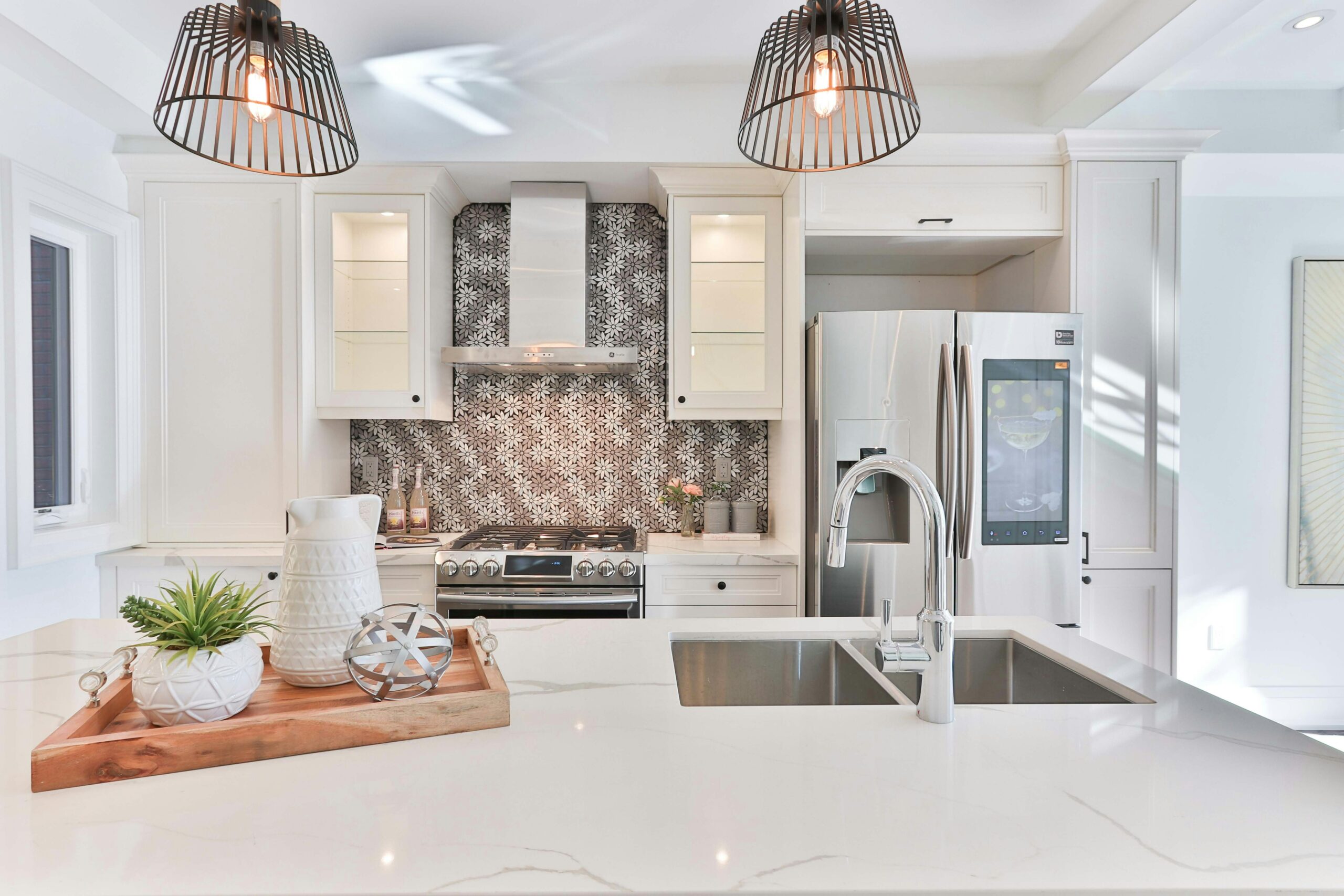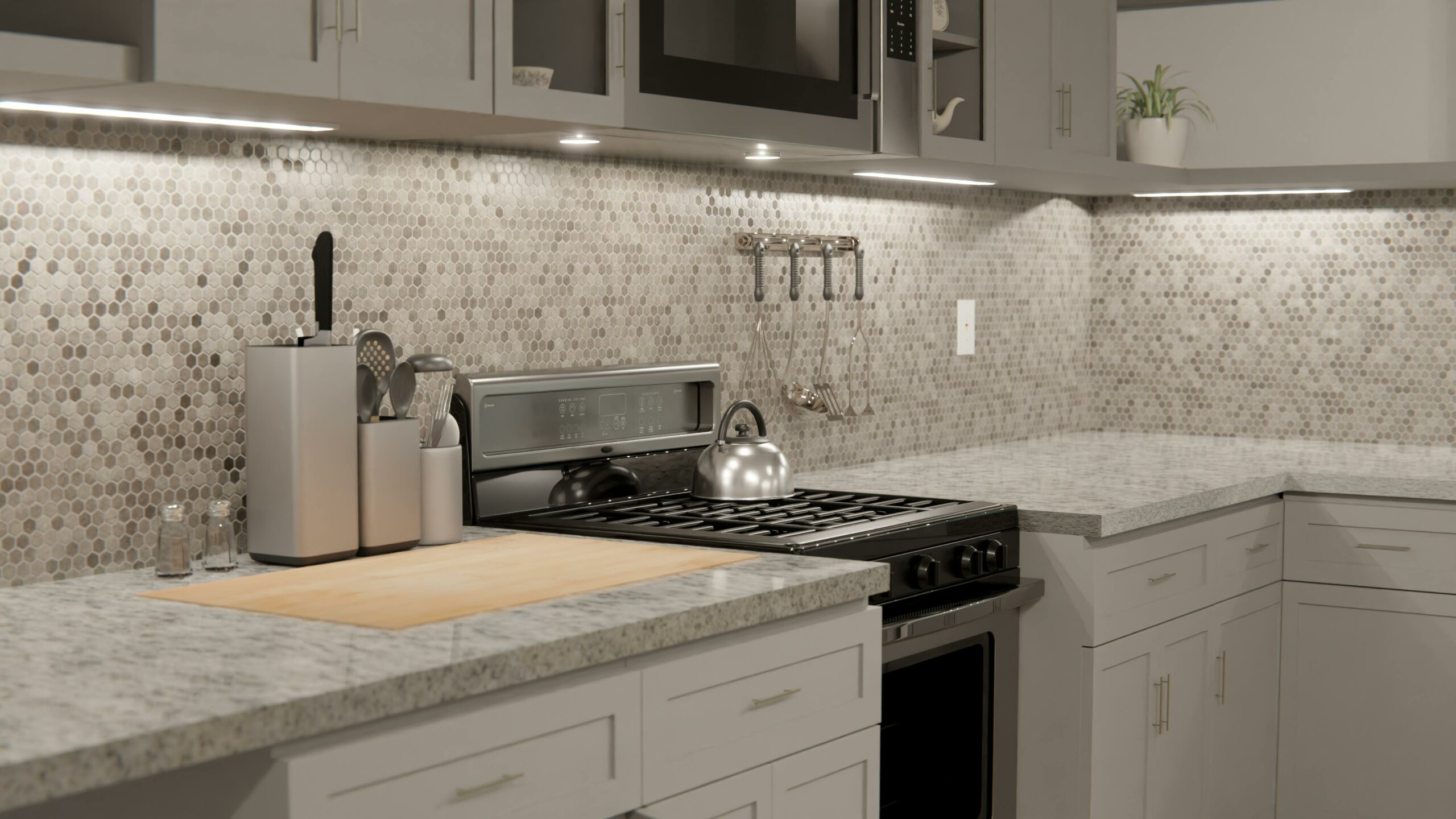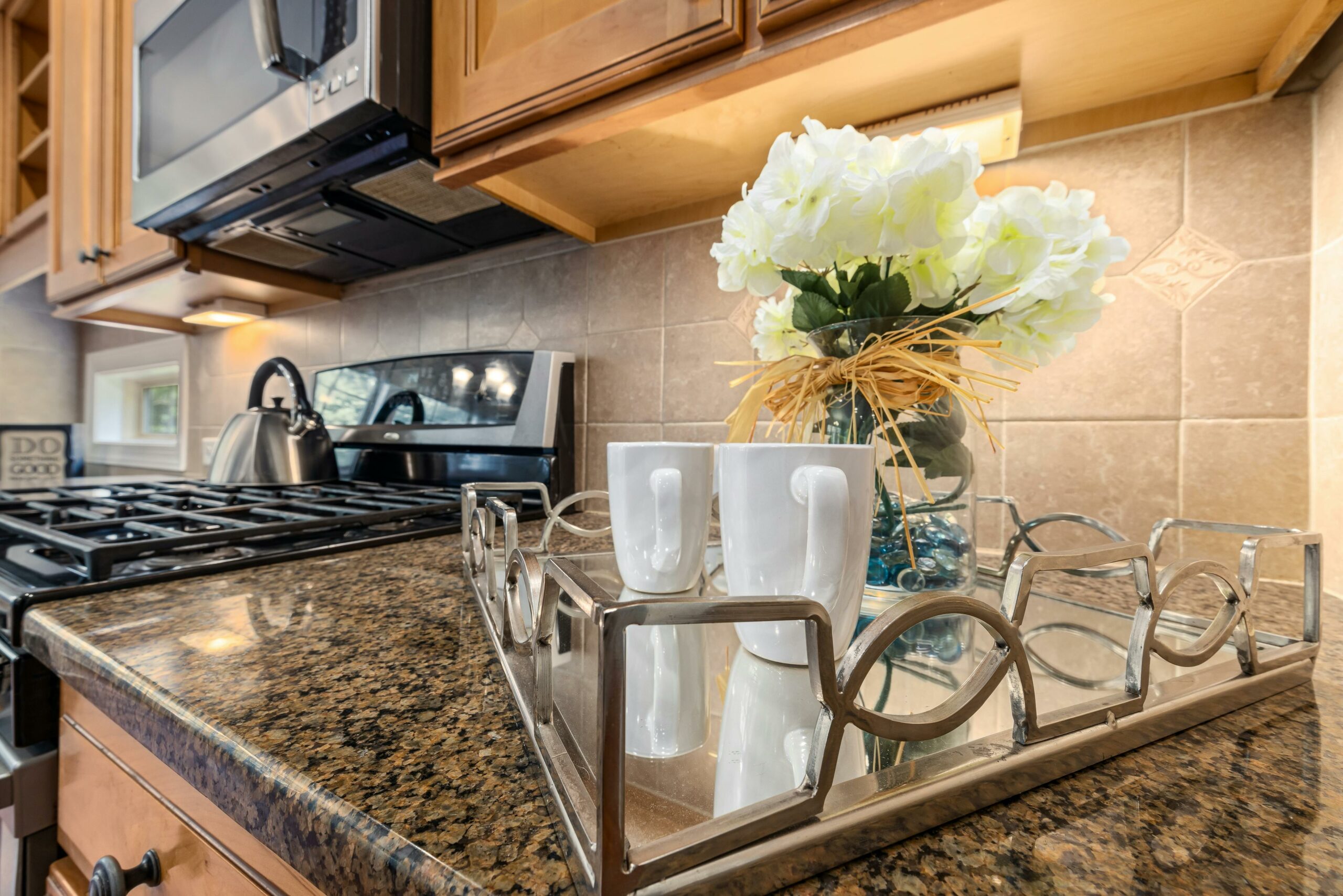Concrete kitchen countertops are increasingly gaining popularity in homes around the world, offering an amalgamation of durability, versatility, and aesthetic appeal. These handmade surfaces, customizable in shapes, sizes, colors, and finishes, bring a unique touch to any kitchen decor, whether rustic or contemporary in style.
Understanding the Durability of Concrete Kitchen Countertops can guide homeowners towards appreciating the true value that this material brings. As we delve into Choosing the Right Design for Concrete Kitchen Countertops, the capacity for individual expression and aesthetic customization becomes apparent. In knowing the Installation Process of Concrete Kitchen Countertops, homeowners gain a comprehensive view of the efforts undertaken to solidify their perfect kitchen space.
Although these countertops require regular maintenance to retain their impeccable finish, our section on Tips for Maintaining Concrete Kitchen Countertops will make it easier than you think. The choice to opt for these countertops is made evident in Why Choose Concrete Kitchen Countertops. We further explore this topic in the Cost Analysis of Concrete Kitchen Countertops and The Lifespan of Concrete Kitchen Countertops sections.
With the objective of a greater appreciation for this unique material, we highlight Concrete VS Other Materials for Kitchen Countertops, and how they stand apart from other conventional choices. Lastly, we touch upon Customizing Your Concrete Kitchen Countertops, thus understanding the infinite possibility of design that homeowners can venture into.
Choosing these countertops is not just about personal aesthetics. It also echoes an appreciation for sustainable living. This is expressed more in The Environmental Impact of Concrete Kitchen Countertops.
Hence, let’s embark on a journey to explore the world of concrete kitchen countertops.
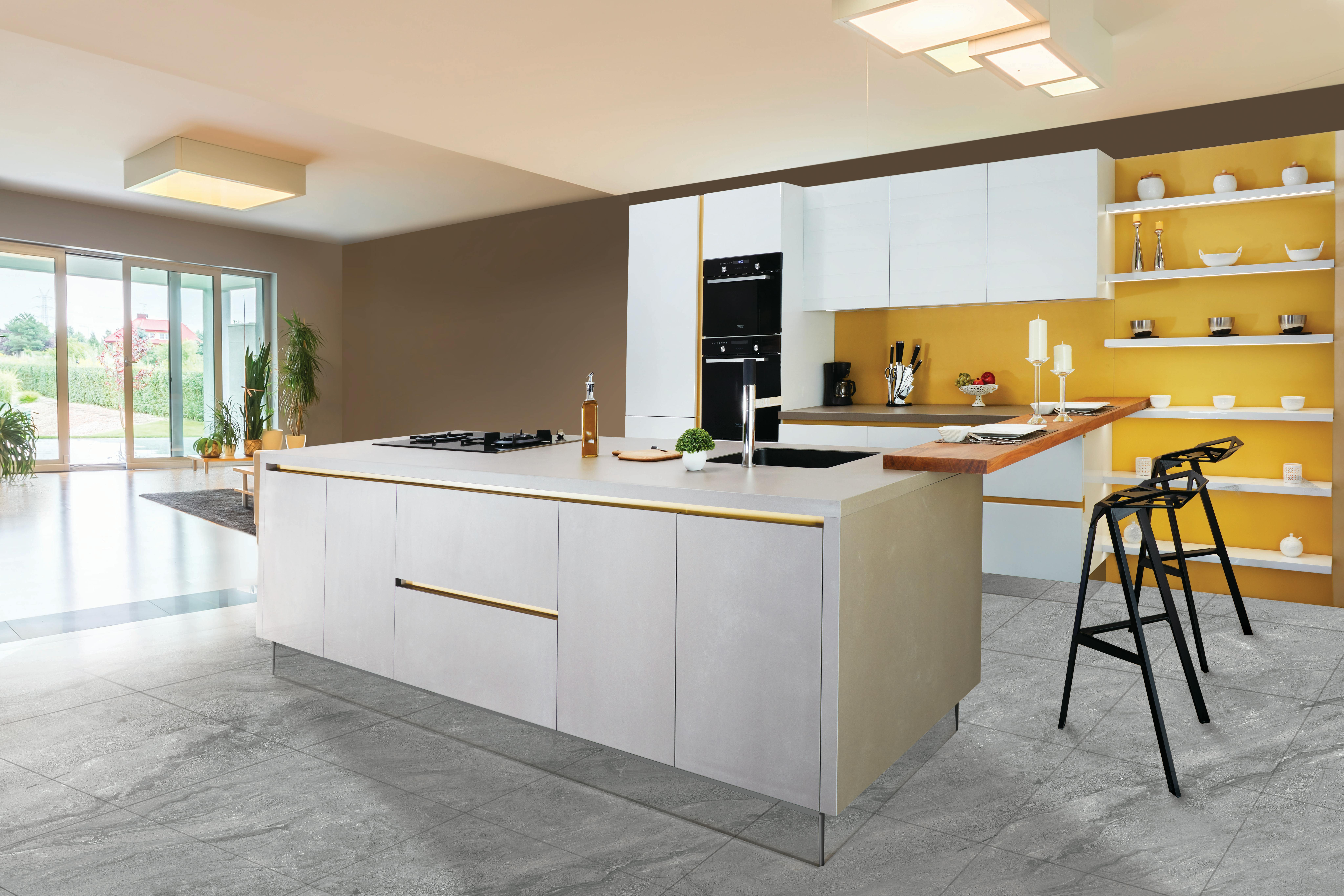
Understanding the Durability of Concrete Kitchen Countertops
Concrete kitchen countertops have gained popularity in recent years due to their durability and unique aesthetic appeal. Understanding the durability of concrete kitchen countertops is essential for homeowners considering this option for their kitchen remodel.
Concrete is a strong and resilient material that can withstand the daily wear and tear of a busy kitchen. Its durability is attributed to its composition, which typically includes a mixture of cement, aggregates, and water. When properly installed and sealed, concrete countertops can last for decades without showing signs of wear or damage.
One of the key factors contributing to the durability of concrete countertops is their resistance to heat. Unlike other materials like laminate or wood, concrete can withstand high temperatures without warping or discoloration. This makes it an ideal choice for homeowners who frequently use hot pots and pans in their kitchen.
Concrete countertops are also highly resistant to scratches and stains. The surface of the countertop can be sealed to prevent liquids from seeping into the material, making it easy to clean and maintain. Additionally, any minor scratches or imperfections can be easily repaired with the use of a concrete sealer or polish.
Another aspect to consider when discussing the durability of concrete countertops is their resistance to impact. Concrete is a solid material that can withstand heavy objects being dropped on its surface without cracking or chipping. This makes it a practical choice for busy kitchens where accidents are more likely to occur.
Overall, the durability of concrete kitchen countertops is one of their main advantages. With proper care and maintenance, these countertops can last for many years, providing homeowners with a durable and stylish surface for their kitchen activities.
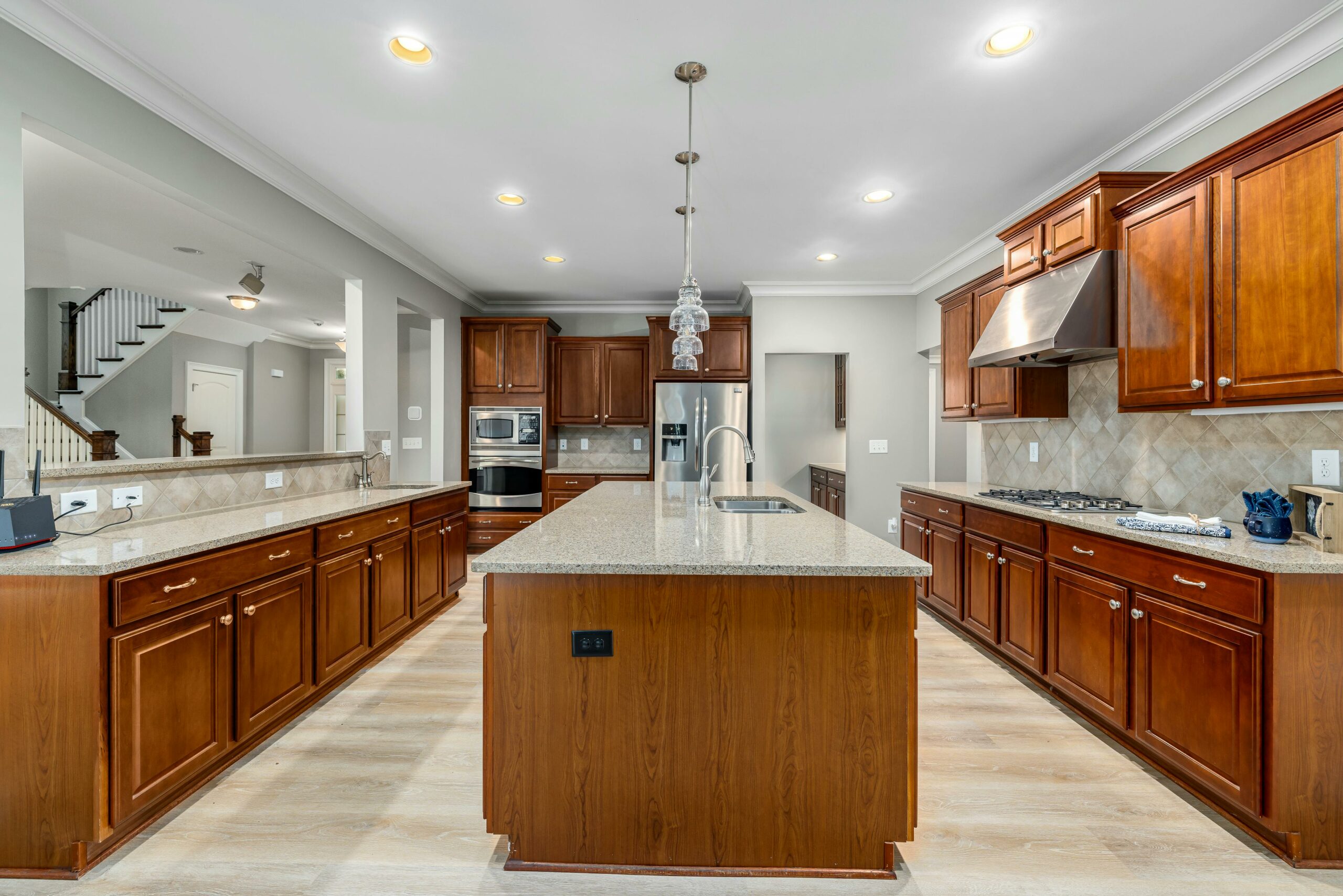
Choosing the Right Design for Concrete Kitchen Countertops
When it comes to concrete kitchen countertops, the design plays a crucial role in enhancing the overall aesthetic appeal of your kitchen. Here are some factors to consider when choosing the right design for your concrete kitchen countertops:
1. Color
The color of your concrete kitchen countertops can greatly impact the overall look and feel of your kitchen. You can choose from a wide range of colors, including natural earth tones, bold and vibrant hues, or even custom colors to match your kitchen’s theme.
2. Texture
The texture of the concrete can add depth and visual interest to your kitchen countertops. You can opt for a smooth and polished finish for a sleek and modern look, or choose a more textured finish for a rustic and industrial feel.
3. Edge Profile
The edge profile of your concrete kitchen countertops can add a touch of elegance and sophistication to your kitchen. There are various edge profiles to choose from, such as straight, beveled, bullnose, or even custom-designed edges to match your personal style.
4. Patterns and Designs
If you want to add a unique and personalized touch to your concrete kitchen countertops, consider incorporating patterns and designs. You can choose from a variety of options, such as geometric patterns, embedded objects, or even custom engraved designs.
5. Backsplash Integration
Integrating the backsplash with your concrete kitchen countertops can create a seamless and cohesive look in your kitchen. You can choose to extend the concrete material from the countertops to the backsplash or opt for complementary materials that complement the overall design.
By carefully considering these design elements, you can choose the right design for your concrete kitchen countertops that not only enhances the beauty of your kitchen but also reflects your personal style and preferences.
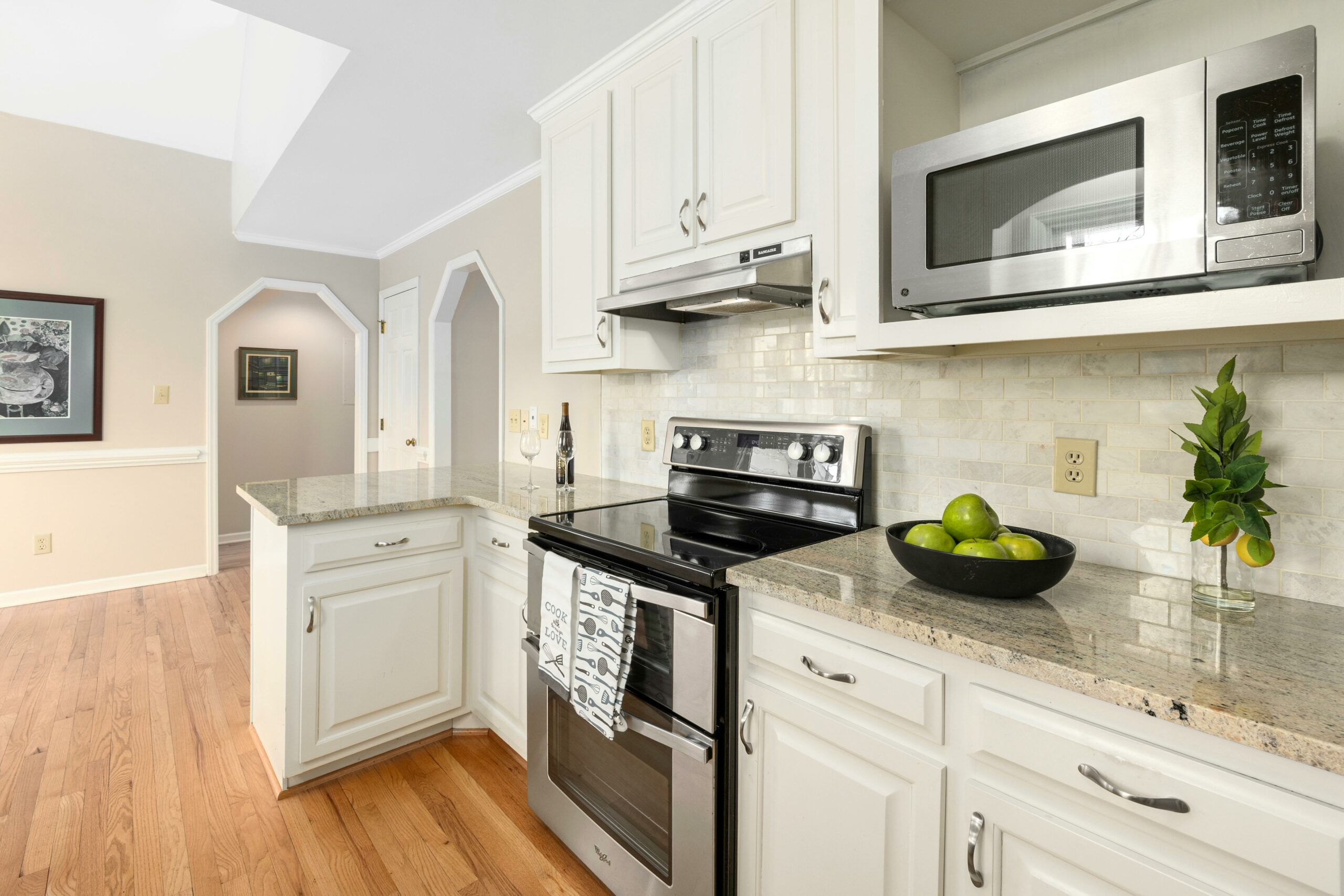
Installation Process
When it comes to installing concrete kitchen countertops, there are several steps involved to ensure a successful and durable result. Here is a breakdown of the installation process:
1. Preparation
Before installing the concrete countertops, it is important to prepare the area properly. This includes measuring and templating the countertops, ensuring the cabinets are level and sturdy, and making any necessary modifications to accommodate the countertops.
2. Forming
Next, the forms for the countertops are created. These forms act as molds and determine the shape and size of the countertops. They are typically made from plywood or melamine and are secured to the cabinets or base.
3. Reinforcement
Once the forms are in place, reinforcement is added to the countertops. This can include steel mesh or rebar, which helps to strengthen the concrete and prevent cracking.
4. Mixing and Pouring
The concrete mixture is then prepared according to the manufacturer’s instructions. It is important to mix the concrete thoroughly to ensure a consistent and strong final product. The concrete is then poured into the forms, taking care to eliminate any air bubbles or voids.
5. Finishing
After the concrete has been poured, it is leveled and smoothed using various tools such as trowels and floats. The surface can also be textured or polished depending on the desired aesthetic.
6. Curing
Once the concrete has been finished, it needs to cure properly. This involves keeping the countertops moist and protected from extreme temperatures for a specified period of time. Curing allows the concrete to fully harden and reach its maximum strength.
7. Sealing
Finally, the countertops are sealed to protect them from stains, scratches, and other damage. There are various sealers available, including topical sealers and penetrating sealers, each with their own advantages and disadvantages.
By following these steps and ensuring proper installation, concrete kitchen countertops can provide a beautiful and durable surface for years to come.
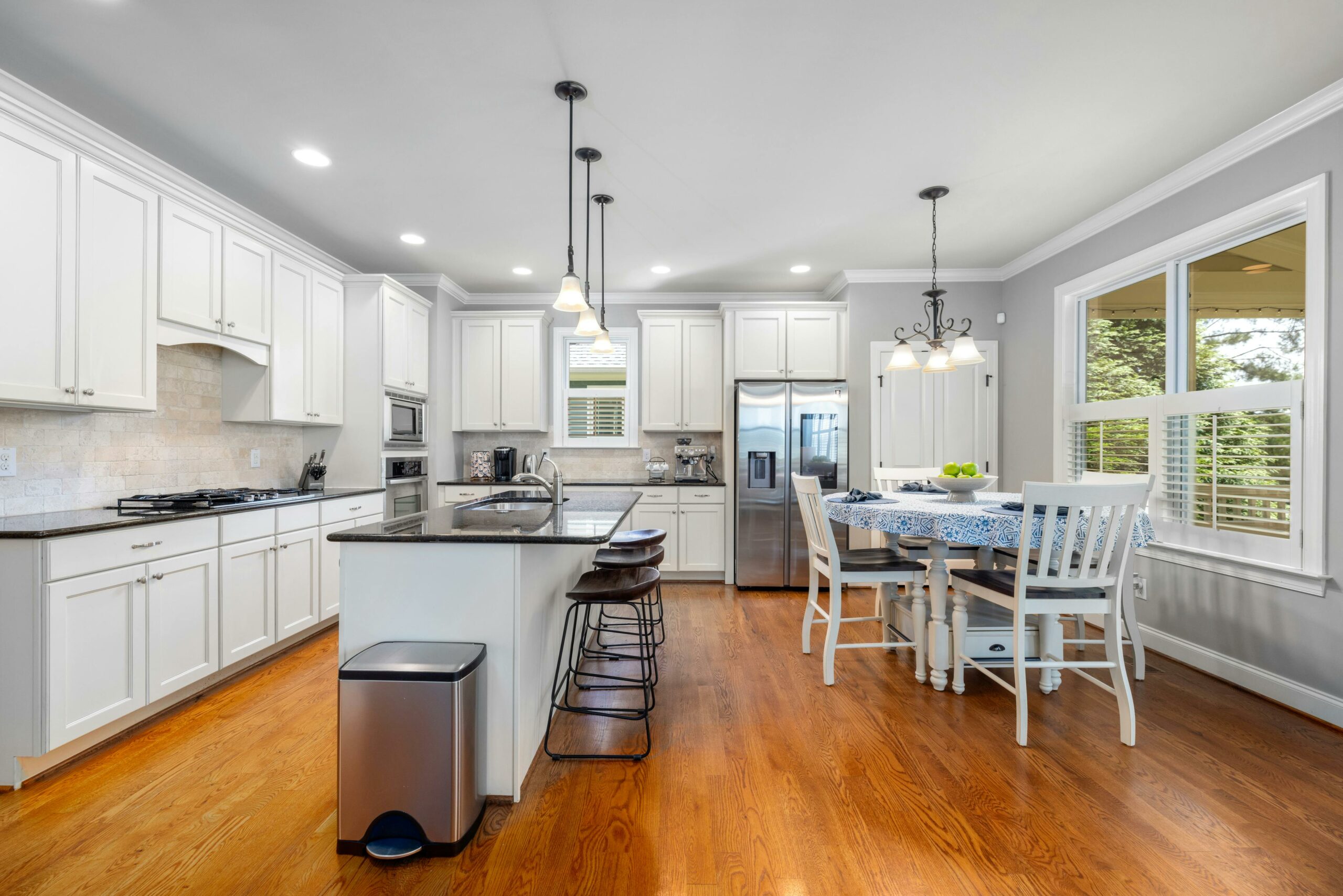
Tips for Maintaining
Concrete kitchen countertops are a durable and stylish choice for any kitchen. However, like any other surface, they require proper maintenance to keep them looking their best. Here are some tips to help you maintain your concrete kitchen countertops:
1. Clean spills immediately
Concrete is porous, so it’s important to clean up spills as soon as they happen to prevent staining. Use a mild dish soap and warm water to gently clean the area. Avoid using abrasive cleaners or scrub brushes, as they can damage the surface.
2. Use cutting boards and trivets
To prevent scratches and heat damage, always use cutting boards and trivets when working with hot pots and pans or cutting food directly on the countertop. This will help preserve the integrity of the concrete surface.
3. Seal the countertop regularly
Sealing your concrete kitchen countertop is essential for maintaining its appearance and protecting it from stains. Apply a high-quality concrete sealer every 1-2 years, or as recommended by the manufacturer, to keep your countertop looking its best.
4. Avoid harsh chemicals
Harsh chemicals, such as bleach or ammonia-based cleaners, can damage the sealer and the concrete itself. Instead, opt for gentle, non-abrasive cleaners specifically designed for use on concrete surfaces.
5. Use coasters and placemats
To prevent water rings and stains from glasses or hot dishes, always use coasters and placemats on your concrete kitchen countertops. This simple habit can go a long way in preserving the beauty of your countertops.
6. Regularly inspect for cracks or damage
Check your concrete kitchen countertops regularly for any signs of cracks or damage. If you notice any issues, it’s important to address them promptly to prevent further damage. Consult a professional if needed.
7. Avoid excessive weight or impact
While concrete is a durable material, it’s still susceptible to damage from excessive weight or impact. Avoid placing heavy objects directly on the countertop and use caution when handling heavy items to prevent any potential damage.
By following these tips, you can ensure that your concrete kitchen countertops remain beautiful and functional for years to come.
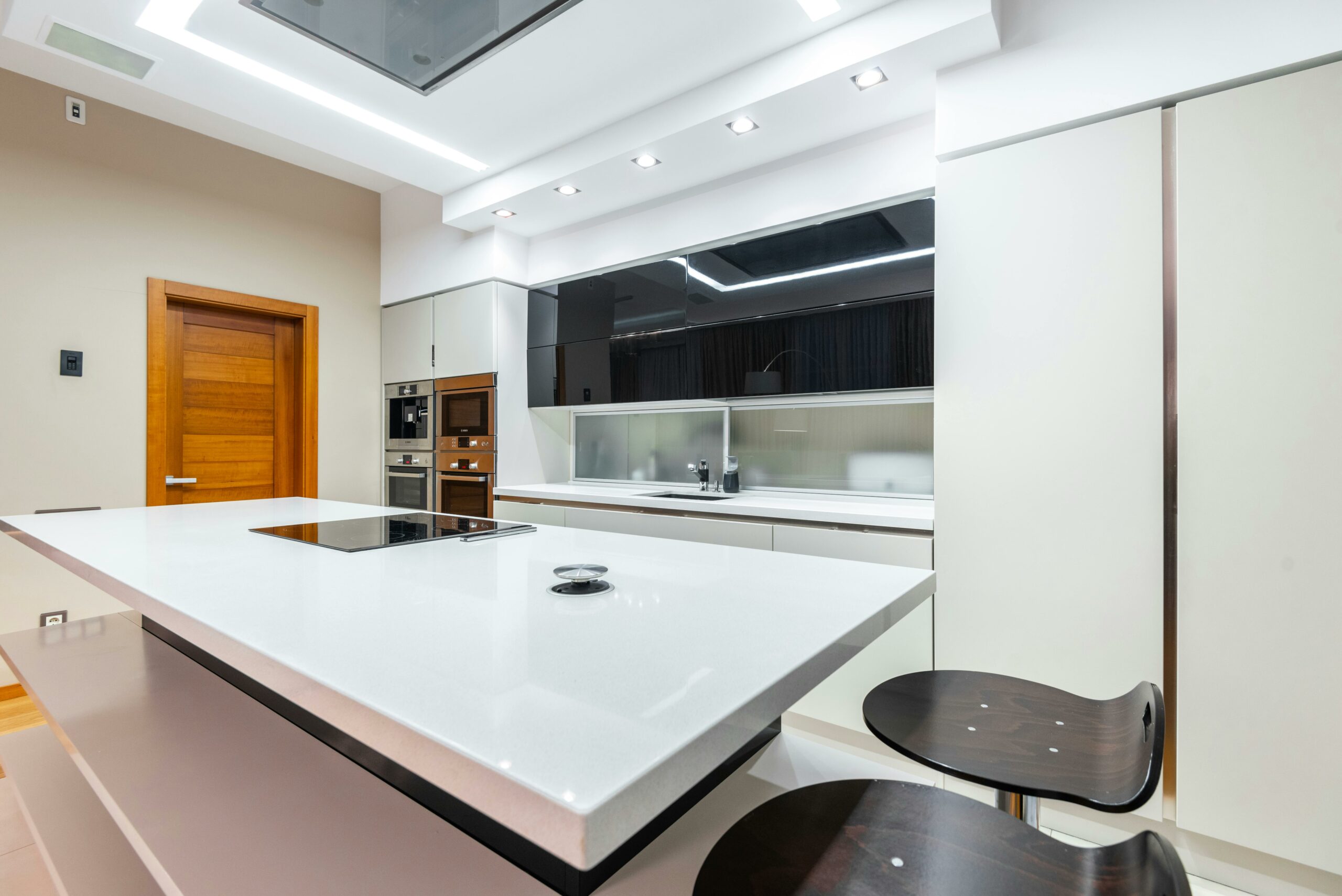
Why Choose Concrete Kitchen Countertops
Concrete kitchen countertops have become increasingly popular in recent years due to their unique combination of durability, versatility, and aesthetic appeal. Here are some compelling reasons why you should consider choosing concrete for your kitchen countertops:
Durability:
Concrete countertops are known for their exceptional durability. Unlike other materials such as laminate or wood, concrete can withstand heavy use and resist scratches, stains, and heat. With proper care and maintenance, concrete countertops can last for decades.
Design Flexibility:
Concrete offers endless design possibilities for your kitchen countertops. It can be customized to fit any shape or size, allowing you to create a truly unique and personalized countertop. Additionally, concrete can be pigmented or stained in a wide range of colors, giving you the freedom to match your countertop to your kitchen’s aesthetic.
Easy Installation:
The installation process for concrete countertops is relatively simple and straightforward. A professional contractor will measure and mold the concrete to fit your kitchen’s dimensions, and then install it onto your cabinets. Compared to other countertop materials, concrete is relatively quick and easy to install.
Low Maintenance:
Concrete countertops require minimal maintenance to keep them looking their best. Regular sealing can help protect the surface from stains and moisture, and occasional resealing may be necessary over time. Cleaning is as simple as using a mild soap and water solution, making concrete countertops a low-maintenance option for busy kitchens.
Environmental Friendliness:
Concrete is an eco-friendly choice for kitchen countertops. It is a sustainable material that can be sourced locally, reducing transportation emissions. Additionally, concrete countertops can be made with recycled materials, further reducing their environmental impact.
Cost-Effective:
Compared to high-end materials like granite or quartz, concrete countertops are a more affordable option. While the cost can vary depending on factors such as size, design complexity, and finishes, concrete generally offers a cost-effective solution for homeowners looking to upgrade their kitchen countertops.
Overall, concrete kitchen countertops offer a winning combination of durability, design flexibility, easy installation, low maintenance, environmental friendliness, and cost-effectiveness. Consider choosing concrete for your kitchen countertops to enjoy these benefits and create a stunning focal point in your kitchen.
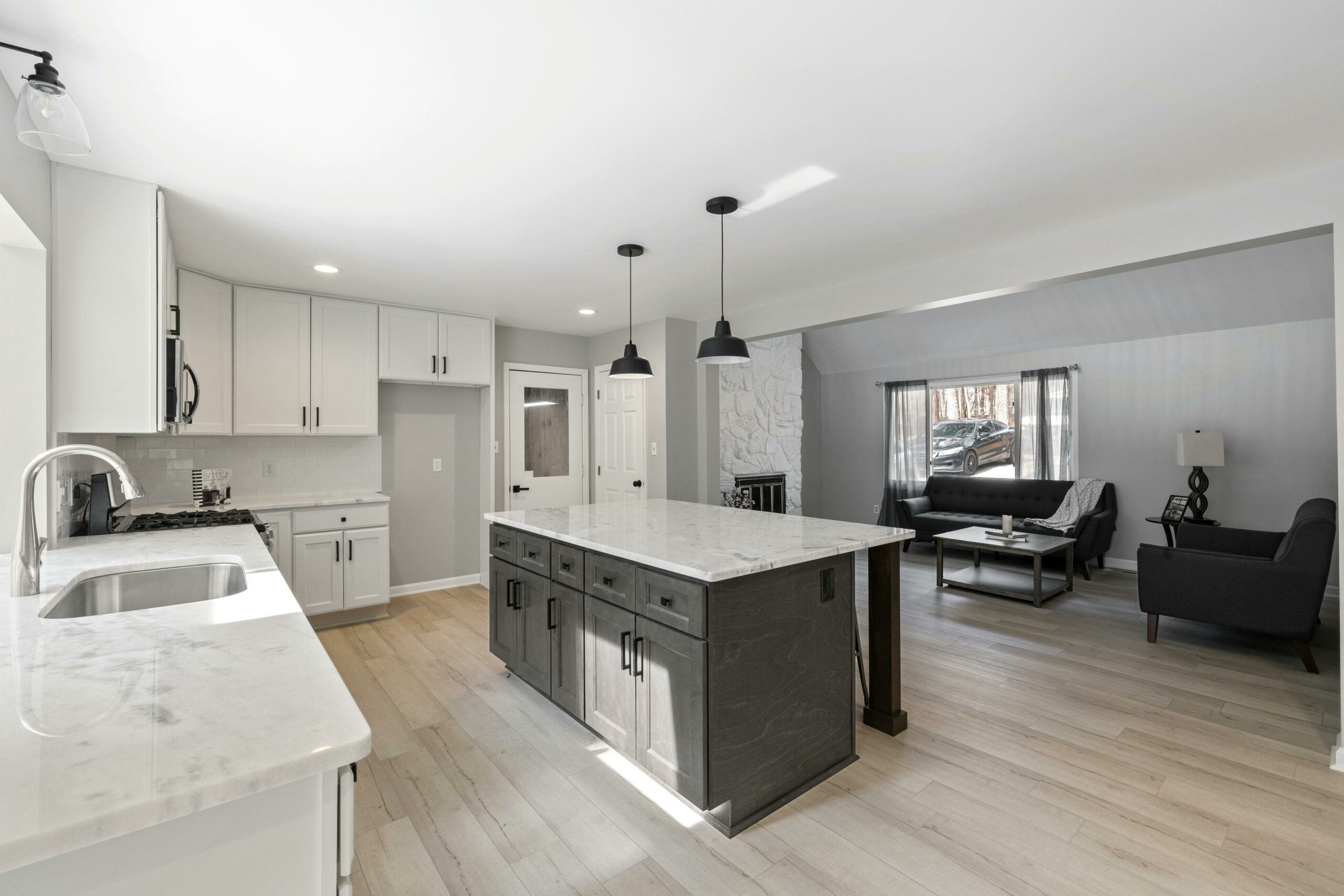
The Environmental Impact
Concrete kitchen countertops have gained popularity in recent years due to their durability and unique aesthetic appeal. However, it is important to consider the environmental impact of using concrete as a material for kitchen countertops.
1. Energy Consumption
Concrete production requires a significant amount of energy. The extraction of raw materials, such as cement and aggregates, and the manufacturing process contribute to greenhouse gas emissions. Additionally, the transportation of these materials to the construction site adds to the overall energy consumption.
2. Carbon Footprint
The production of cement, a key component of concrete, releases a substantial amount of carbon dioxide into the atmosphere. Cement production is responsible for approximately 8% of global carbon dioxide emissions. This contributes to climate change and the depletion of natural resources.
3. Water Usage
The manufacturing process of concrete countertops requires a significant amount of water. From the mixing of ingredients to the curing process, water is used extensively. This can put a strain on local water sources, especially in areas already facing water scarcity issues.
4. Waste Generation
During the installation of concrete countertops, there is often a significant amount of waste generated. This includes excess materials, such as concrete mix, as well as packaging materials. Proper waste management and recycling practices can help mitigate the environmental impact of this waste.
5. Durability and Longevity
While concrete countertops are known for their durability, their long lifespan can also be seen as an environmental benefit. Unlike other countertop materials that may need to be replaced more frequently, concrete countertops can last for decades with proper care and maintenance. This reduces the overall environmental impact associated with countertop replacements.
It is important to consider these environmental factors when choosing concrete as a material for kitchen countertops. By making informed decisions and implementing sustainable practices, the environmental impact of concrete countertops can be minimized.
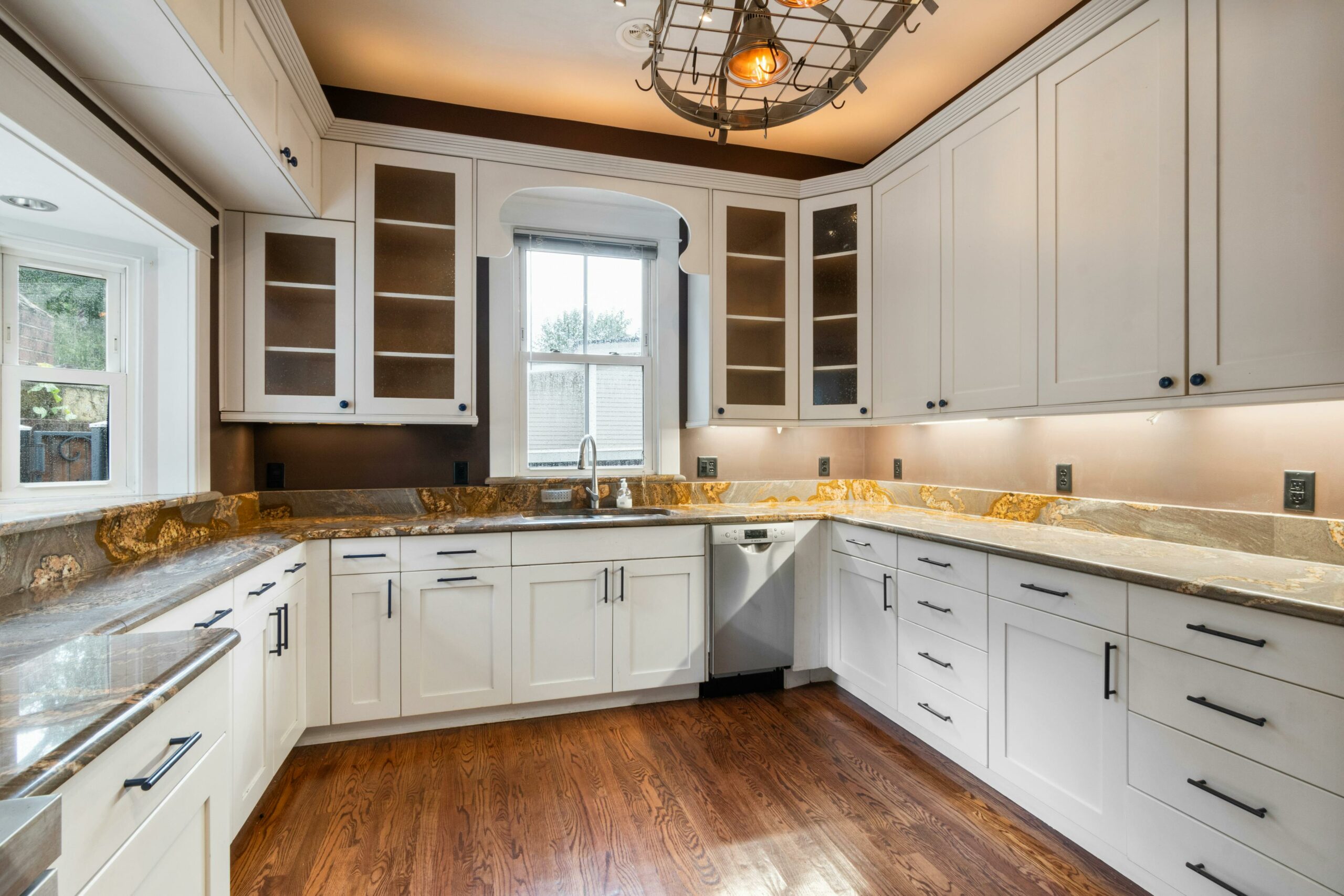
Cost Analysis
When considering concrete kitchen countertops, it’s important to understand the cost implications. While concrete countertops can offer a unique and stylish look to your kitchen, they may not always be the most budget-friendly option. Here, we will break down the various factors that contribute to the cost of concrete kitchen countertops.
Materials
The cost of materials is one of the main factors to consider when analyzing the cost of concrete kitchen countertops. The type and quality of concrete used, as well as any additional materials such as reinforcement, sealants, and pigments, can significantly impact the overall cost.
Size and Complexity
The size and complexity of your kitchen countertops will also affect the cost. Larger countertops or ones with intricate designs may require more materials and labor, resulting in a higher price tag.
Installation
The installation process for concrete kitchen countertops can be labor-intensive and time-consuming. Depending on the complexity of the design and the expertise required, the cost of installation can vary. It’s essential to hire a professional contractor who specializes in concrete countertops to ensure a proper and durable installation.
Maintenance
While concrete countertops are known for their durability, they do require regular maintenance to keep them in optimal condition. This can include resealing the surface periodically and avoiding harsh cleaning agents that can damage the concrete. The cost of maintenance should be factored into the overall cost analysis.
Durability and Longevity
Concrete kitchen countertops are known for their durability and longevity. When properly cared for, they can last for many years without the need for replacement. This long lifespan can offset the initial cost, making concrete countertops a cost-effective choice in the long run.
Comparing Costs with Other Materials
It’s also essential to compare the cost of concrete kitchen countertops with other materials commonly used for kitchen countertops, such as granite, marble, or quartz. Concrete countertops may have a higher upfront cost compared to some of these materials, but they offer unique customization options and can be more cost-effective in the long term.
Ultimately, the cost analysis of concrete kitchen countertops will vary depending on various factors. It’s crucial to consider your budget, design preferences, and long-term goals when making a decision. Consulting with a professional contractor can provide you with a more accurate cost estimate based on your specific needs and requirements.
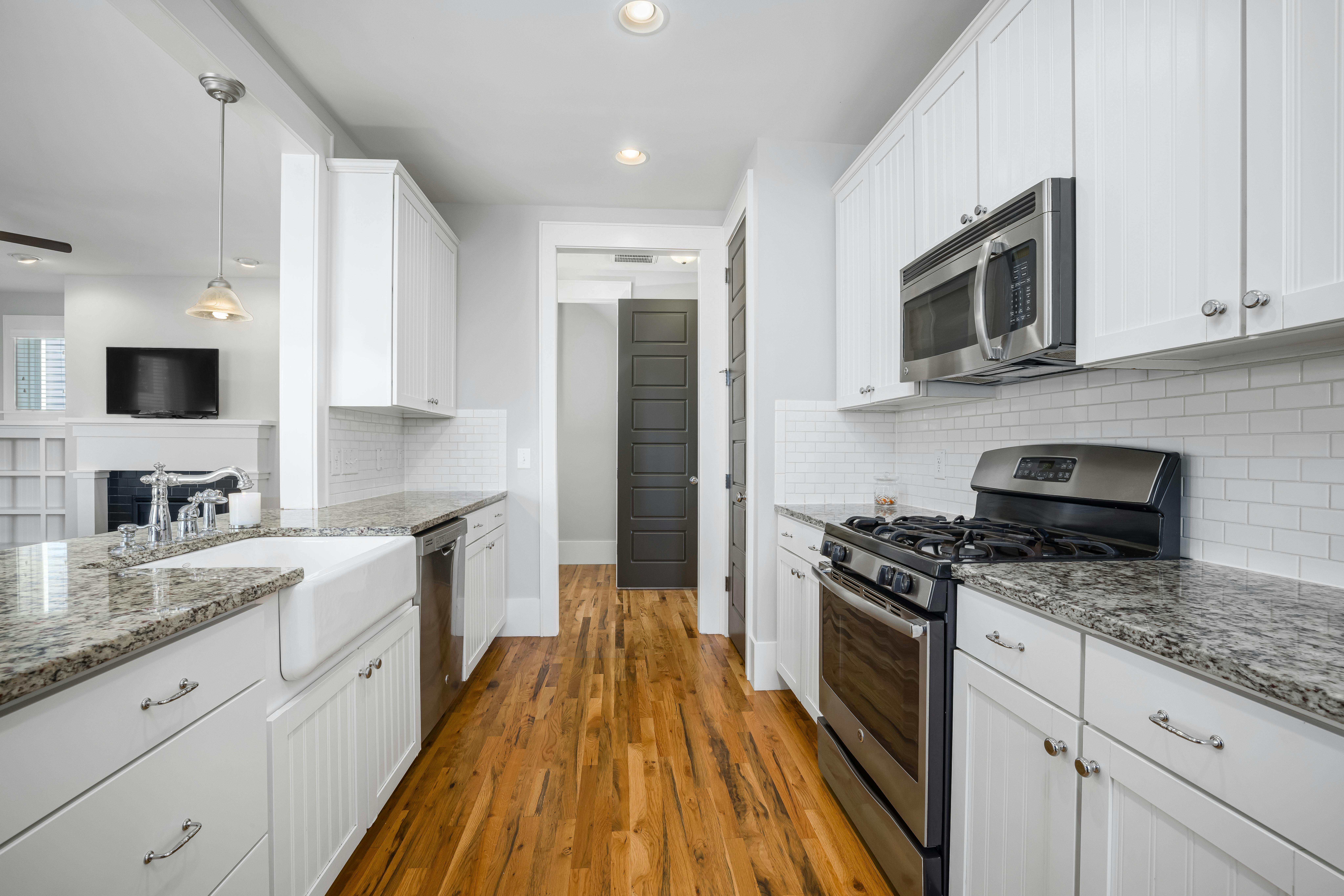
The Lifespan of Concrete Kitchen Countertops
Concrete kitchen countertops are known for their durability and longevity. With proper care and maintenance, they can last for many years, making them a popular choice for homeowners. The lifespan of concrete kitchen countertops can vary depending on several factors, including the quality of the materials used, the installation process, and the level of maintenance.
Quality of Materials
The quality of the materials used in the construction of concrete kitchen countertops plays a crucial role in determining their lifespan. High-quality concrete mixtures that are properly proportioned and reinforced with materials like steel or fiberglass can significantly increase the durability and longevity of the countertops. It is important to choose materials that are specifically designed for use in kitchen countertops to ensure their longevity.
Installation Process
The installation process of concrete kitchen countertops also affects their lifespan. It is essential to hire experienced professionals who have expertise in working with concrete to ensure proper installation. The countertops should be properly sealed to prevent moisture penetration, which can lead to cracks and damage over time. Additionally, the countertops should be installed with proper support and reinforcement to prevent sagging or structural issues.
Maintenance
Regular maintenance is crucial for prolonging the lifespan of concrete kitchen countertops. It is recommended to clean the countertops regularly using mild soap and water. Avoid using abrasive cleaners or harsh chemicals that can damage the sealer and the surface of the countertops. It is also important to promptly clean up any spills to prevent staining. Applying a sealant every few years can help protect the countertops from stains and maintain their appearance.
Furthermore, it is important to avoid placing hot pans or pots directly on the countertops as extreme heat can cause cracks or discoloration. Using cutting boards and trivets can help protect the surface of the countertops from scratches and heat damage. Regularly inspect the countertops for any signs of wear or damage and address them promptly to prevent further deterioration.
By following these maintenance practices, concrete kitchen countertops can have a lifespan of 20 to 30 years or even longer.
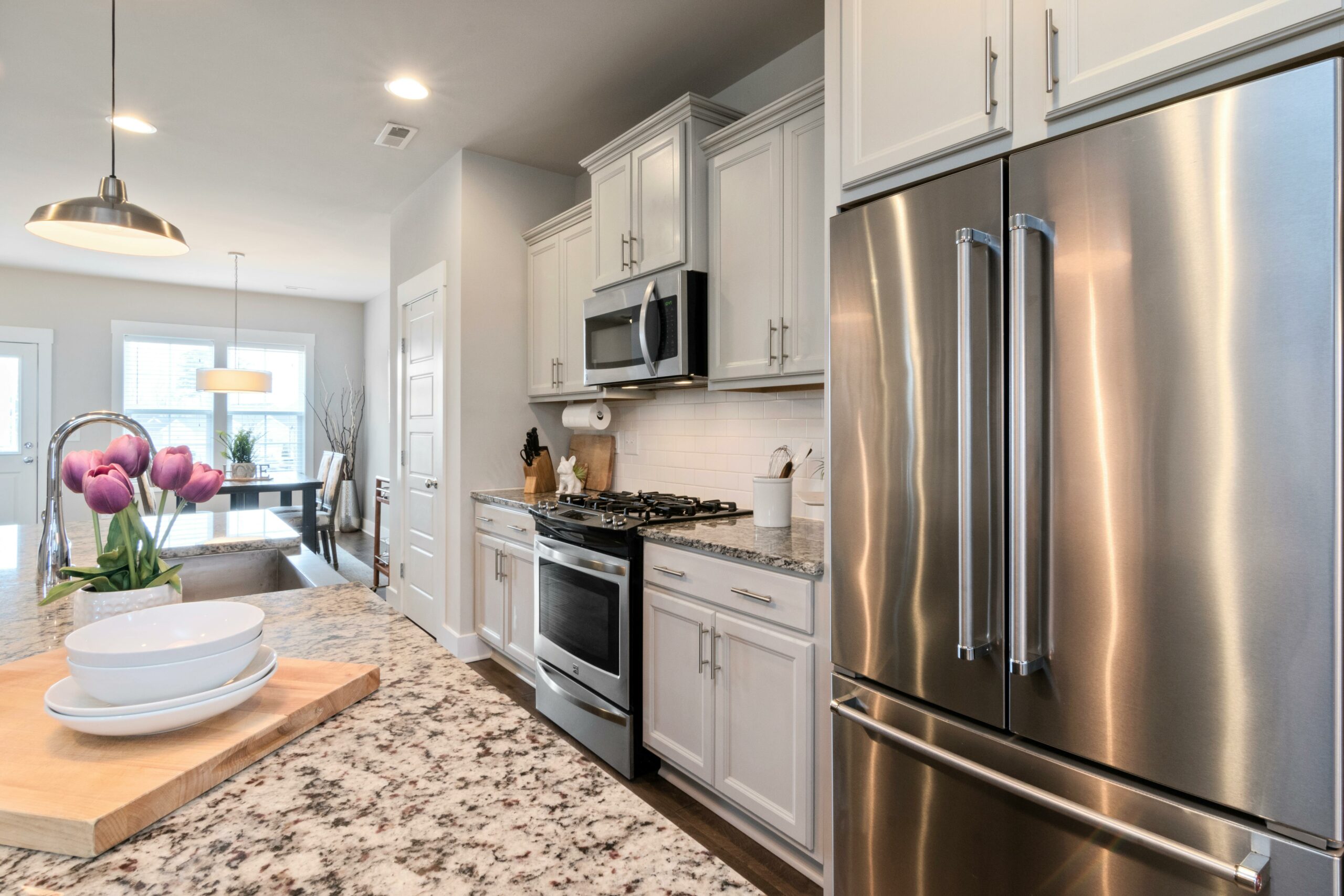
Concrete VS Other Materials for Kitchen Countertops
When it comes to choosing the perfect material for your kitchen countertops, there are several options available. One popular choice is concrete, which offers a unique blend of durability, versatility, and aesthetic appeal. However, it’s important to consider how concrete compares to other materials commonly used for kitchen countertops.
1. Granite
Granite is a natural stone that is known for its durability and beauty. It is available in a wide range of colors and patterns, making it a versatile choice for any kitchen design. While granite is resistant to heat and scratches, it does require regular sealing to prevent staining.
2. Quartz
Quartz countertops are engineered stone surfaces that are made by combining natural quartz with resins and pigments. They offer a wide range of colors and patterns and are highly resistant to stains, scratches, and heat. Quartz countertops also require minimal maintenance, as they do not need to be sealed.
3. Marble
Marble is a luxurious natural stone that is prized for its elegance and timeless beauty. It is available in a variety of colors and patterns, each with its own unique veining. While marble is heat resistant, it is more prone to scratches and staining compared to other materials. It also requires regular sealing and maintenance to preserve its appearance.
4. Solid Surface
Solid surface countertops are made from a blend of acrylic or polyester resins and natural minerals. They offer a seamless and non-porous surface that is resistant to stains, scratches, and heat. Solid surface countertops are available in a wide range of colors and patterns, making them a versatile choice for any kitchen.
5. Stainless Steel
Stainless steel countertops are a popular choice for modern and industrial-style kitchens. They offer a sleek and minimalist look and are highly resistant to heat, stains, and bacteria. However, stainless steel countertops can be prone to scratches and fingerprints, requiring regular cleaning and maintenance.
6. Concrete
Concrete countertops have gained popularity in recent years due to their durability and customizable nature. They can be cast in any shape or size and can be customized with various colors, textures, and finishes. Concrete countertops are heat and scratch-resistant, but they do require regular sealing to prevent staining.
Overall, concrete countertops offer a unique blend of durability, versatility, and customization options. However, it’s important to consider your specific needs and preferences when choosing the right material for your kitchen countertops.

Customizing Your Concrete Kitchen Countertops
When it comes to customizing your concrete kitchen countertops, the possibilities are endless. Concrete countertops offer a versatile and customizable option for homeowners who want a unique and personalized look for their kitchen.
Color Options
One of the biggest advantages of concrete countertops is the ability to choose from a wide range of colors. Concrete can be pigmented to match any color scheme, allowing you to create a countertop that perfectly complements your kitchen decor. Whether you prefer a bold and vibrant hue or a more subtle and neutral tone, there is a color option to suit your taste.
Texture and Finish
Concrete countertops can be customized to achieve different textures and finishes. You can opt for a smooth and polished surface for a sleek and modern look, or choose a more textured finish for a rustic and natural appeal. The finish can be further enhanced with the use of sealers and coatings to add depth and protection to the countertop.
Edge Profiles
The edge profile of your concrete countertop can also be customized to match your desired aesthetic. There are various edge profiles to choose from, including straight edges, beveled edges, bullnose edges, and more. The edge profile can greatly impact the overall look and feel of your countertop, so it’s important to choose one that complements your kitchen style.
Inlays and Embedments
If you want to add a unique touch to your concrete countertop, consider incorporating inlays or embedments. Inlays can be made from materials like glass, stones, or even recycled materials, and can be placed within the concrete to create a stunning focal point. Embedments, on the other hand, are objects that are partially embedded into the surface of the countertop, such as shells or coins, adding a personal touch and creating visual interest.
Integrated Features
Concrete countertops can also be customized to include integrated features that enhance functionality. This can include built-in sinks, drainboards, or even custom-designed cutting boards. By incorporating these features directly into the countertop, you can maximize space and create a seamless and cohesive design.
When customizing your concrete kitchen countertops, it’s important to work with a professional who specializes in concrete countertop fabrication. They will have the expertise and knowledge to guide you through the customization process and ensure that your vision is brought to life.

